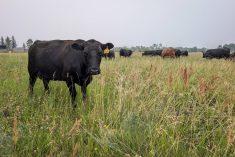Compared to last week, prices for yearling steers were down $2-$4 while yearling heifers were down $4 to as much as $8. Calf markets were down $3-$6 from last week.
Negative feeding margins, colder temperatures and tight feed grain supplies were the three main factors setting a negative tone in the feeder market. Rail imports of U.S. corn are running 10-14 days behind schedule. It’s not logical to bring in fresh replacements when one is struggling to find feed on a daily basis. Secondly, cold temperatures also caused feedlot operators to think twice. The feeder market incorporated a small risk discount given the adverse weather. Alberta packers were buying fed cattle on a live basis in the range of $161-$163, up from the average price of $154 last week. Despite the stronger fed market, feeding margins remain in negative territory. Order buyers had a difficult time finding homes for feeders last week. Ontario buying interest appears to have subsided. On the U.S. front, buyers appear to be more interested in lighter-weight calves rather than yearlings. The colder temperatures caused U.S. interest to back away from the market for feather-light bawlers.
Read Also

B.C. ostriches culled, CFIA confirms
Ostriches on an embattled Edgewood, B.C. farm have been culled after a prolonged legal battle, the Canadian Food Inspection Agency has confirmed.
In central Alberta, medium-frame, thick butter, red mixed heifers with full health records on grain diet averaging just over 800 lbs. were valued at $172; medium- to larger-frame Simmental-based steers with medium flesh levels with full health records on grain diet dropped the gavel at $192 in the same region. In northwestern Manitoba, Charolais-based heifers averaging 830 lbs. with medium to heavier flesh were quoted at $163. In central Saskatchewan, larger-frame medium-flesh Angus-blended steers weighing just over 900 lbs. were quoted at $188; similar-quality 853-lb. heifers were valued at $168 in the same region.
South of Edmonton, Limousin-mixed steers averaging 660 lbs. fully weaned with full vaccinations were valued at $205; similar-quality heifers averaging 650 lbs. were reported at $185. Southeast of Saskatoon, a small group of Angus-based semi-weaned steers averaging 575 lbs. were quoted at $225 and Charolais mixed heifers averaging just under 600 lbs. were reported at $189. In the Lethbridge area, short weaned mixed steers averaging 605 lbs. were valued at $212 delivered to the feedlot and similar-quality heifers averaging 500 lbs. were priced at $206. Calf prices were quite variable. Unweaned calves were discounted $4 to as much as $8 from their fully weaned counterparts. The risk was too high buying calves straight off their mothers given the weather conditions.
Crop-year-to-date U.S. corn sales to Canada for the week ending Jan. 13 were 3.2 million tonnes. We’ll likely see over five million tonnes of U.S. corn trade into Western Canada during the 2021-22 crop year. During the 2020-21, total Canadian demand for non-durum wheat and barley was about 10 million tonnes. Approximately 50 per cent of western Canadian feed demand will be satisfied with corn. Corn prices and availability are two major factors setting the price structure for feeder cattle.
— Jerry Klassen is president and founder of Resilient Capital, specializing in proprietary commodity futures trading and market analysis. Jerry consults with feedlots on risk management and writes a weekly cattle market commentary. He can be reached at 204-504-8339 or via his website at ResilCapital.com.















